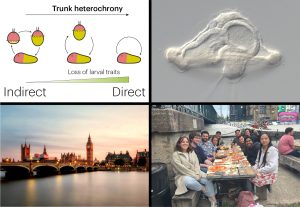PhD in marine invertebrate EvoDevo –– Queen Mary University of London
Posted by Jose M. Martin-Duran, on 27 July 2023
Job type: PhD
Location: London, United Kingdom
Closing Date: 1 September 2023
The Martín-Durán Lab is looking for a PhD student to join a vibrant research group studying the evolution of animals and their development using marine invertebrate worms. Currently, the Martín-Durán Lab consists of 2 postdoctoral researchers and 4 PhD students. We are funded by the European Commission through a prestigious ERC Starting Grant and by UK national funding bodies (Royal Society, Wellcome Trust, BBSRC and the Leverhulme Trust). You can learn more about who we are and what we do at www.martinduranlab.com or by contacting Chema Martin at chema.martin@qmul.ac.uk
Project description
- In this project, you will rigorously answer fundamental questions in Biology using state-of-the-art experimental and computation approaches.
- You will have access to large genomic databases and in-house live organisms to fuel your investigation.
- You will gain experience in developmental biology and molecular techniques (gene expression analyses, epigenomics), bioinformatics (workflows to analyse CUT&Tag data), and statistics.
- You will be encouraged to develop your ideas, hypotheses and independence while supported with high-quality mentoring.

Training
The School of Biological and Behavioural Sciences at Queen Mary is one of the UK’s elite research centres, according to the 2021 Research Excellence Framework (REF). We offer a multi-disciplinary research environment and have approximately 180 PhD students working on projects in the biological and psychological sciences. Our students have access to various research facilities supported by experienced staff and a range of student support services.
Our PhD students become part of Queen Mary’s Doctoral College, which provides training and development opportunities, advice on funding, and financial research support. Our students also have access to a Researcher Development Programme designed to help recognise and develop key skills and attributes needed to manage research effectively and prepare for the next stages of their careers.
In this project, you will learn state-of-the-art molecular techniques for epigenomics (ATAC-seq, CUT&Tag) and developmental biology (in situ hybridisation, immunostaining, confocal microscopy). You will get hands-on experimental approaches and develop proficiency in computational and statistical analyses. In addition to focused training, you will gain project management and presentation skills and participate in international collaborations and networking.
Eligibility
Applications are invited from outstanding candidates with or expecting to receive a first or upper-second-class (2:1) honours degree in an area relevant to the project, such as zoology, molecular and developmental biology, biochemistry and bioinformatics. A masters degree is desirable but not essential.
The most important qualification is your motivation, enthusiasm and that the project appeals to you. Although not essential, some previous computational experience would be a plus. We can envisage strong candidates coming through a variety of routes, including:
- practical molecular biology
- developmental and cell biology
- computational biology
Applicants must provide evidence of their English language ability. Please see our English language requirements page for details: https://www.qmul.ac.uk/international-students/englishlanguagerequirements/postgraduateresearch/
Informal enquiries about the project can be sent to Chema Martin at chema.martin@qmul.ac.uk. Formal applications must be submitted through our online form by the stated deadline (1st of September).
Diversity
The School of Biological and Behavioural Sciences is committed to promoting diversity in science; we have been awarded an Athena Swan Silver Award. We positively welcome applications from underrepresented groups.
http://hr.qmul.ac.uk/equality/
https://www.qmul.ac.uk/sbcs/about-us/athenaswan/
Funding details
The Leverhulme Trust funds this studentship and will cover home tuition fees, providing an annual tax-free maintenance allowance for 3 years at the UKRI rate (£19,668 in 2022/23).
For international students interested in applying, please note that this studentship only covers home tuition fees and students will need to cover the difference in fees between the home and overseas basic rate. Tuition fee rates for 2023-24 are to be confirmed. Details on current (2022-23) tuition fee rates can be found at: https://www.qmul.ac.uk/postgraduate/research/funding_phd/tuition-fees/
References
Martín-Zamora, F.M., Liang, Y., Guynes, K. et al. Annelid functional genomics reveal the origins of bilaterian life cycles. Nature 615, 105–110 (2023). https://doi.org/10.1038/s41586-022-05636-7
Salary: £19,668/annum (UKRI rates)
Start date: 1 January 2024
Closing Date: 1 September 2023
Scientific fields: Evo-devo and eco-evo-devo, Early embryogenesis
Model systems: Other invertebrate
Duration: Fixed term
Minimum qualifications: BSc and MSc

